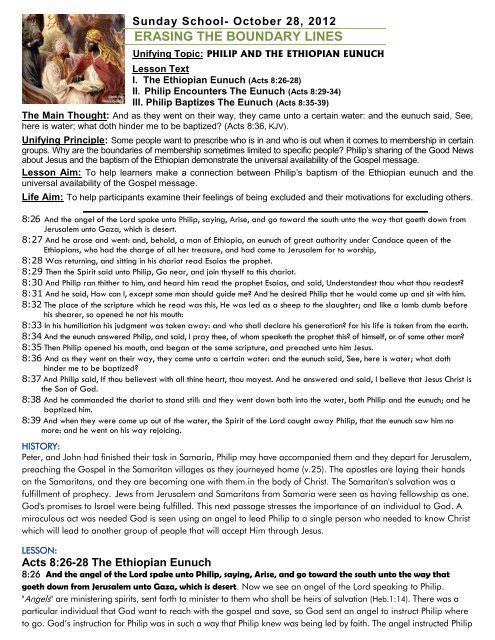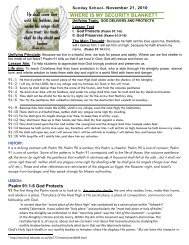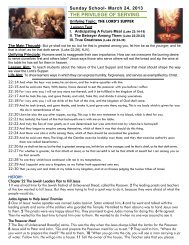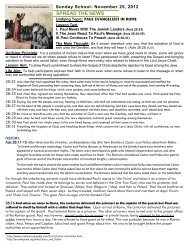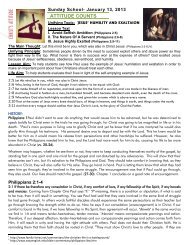ERASING THE BOUNDARY LINES - pitwm.net
ERASING THE BOUNDARY LINES - pitwm.net
ERASING THE BOUNDARY LINES - pitwm.net
Create successful ePaper yourself
Turn your PDF publications into a flip-book with our unique Google optimized e-Paper software.
Sunday School- October 28, 2012<br />
<strong>ERASING</strong> <strong>THE</strong> <strong>BOUNDARY</strong> <strong>LINES</strong><br />
Unifying Topic: PHILIP AND <strong>THE</strong> ETHIOPIAN EUNUCH<br />
Lesson Text<br />
I. The Ethiopian Eunuch (Acts 8:26-28)<br />
II. Philip Encounters The Eunuch (Acts 8:29-34)<br />
III. Philip Baptizes The Eunuch (Acts 8:35-39)<br />
The Main Thought: And as they went on their way, they came unto a certain water: and the eunuch said, See,<br />
here is water; what doth hinder me to be baptized (Acts 8:36, KJV).<br />
Unifying Principle: Some people want to prescribe who is in and who is out when it comes to membership in certain<br />
groups. Why are the boundaries of membership sometimes limited to specific people Philip’s sharing of the Good News<br />
about Jesus and the baptism of the Ethiopian demonstrate the universal availability of the Gospel message.<br />
Lesson Aim: To help learners make a connection between Philip’s baptism of the Ethiopian eunuch and the<br />
universal availability of the Gospel message.<br />
Life Aim: To help participants examine their feelings of being excluded and their motivations for excluding others.<br />
8:26 And the angel of the Lord spake unto Philip, saying, Arise, and go toward the south unto the way that goeth down from<br />
Jerusalem unto Gaza, which is desert.<br />
8:27 And he arose and went: and, behold, a man of Ethiopia, an eunuch of great authority under Candace queen of the<br />
Ethiopians, who had the charge of all her treasure, and had come to Jerusalem for to worship,<br />
8:28 Was returning, and sitting in his chariot read Esaias the prophet.<br />
8:29 Then the Spirit said unto Philip, Go near, and join thyself to this chariot.<br />
8:30 And Philip ran thither to him, and heard him read the prophet Esaias, and said, Understandest thou what thou readest<br />
8:31 And he said, How can I, except some man should guide me And he desired Philip that he would come up and sit with him.<br />
8:32 The place of the scripture which he read was this, He was led as a sheep to the slaughter; and like a lamb dumb before<br />
his shearer, so opened he not his mouth:<br />
8:33 In his humiliation his judgment was taken away: and who shall declare his generation for his life is taken from the earth.<br />
8:34 And the eunuch answered Philip, and said, I pray thee, of whom speaketh the prophet this of himself, or of some other man<br />
8:35 Then Philip opened his mouth, and began at the same scripture, and preached unto him Jesus.<br />
8:36 And as they went on their way, they came unto a certain water: and the eunuch said, See, here is water; what doth<br />
hinder me to be baptized<br />
8:37 And Philip said, If thou believest with all thine heart, thou mayest. And he answered and said, I believe that Jesus Christ is<br />
the Son of God.<br />
8:38 And he commanded the chariot to stand still: and they went down both into the water, both Philip and the eunuch; and he<br />
baptized him.<br />
8:39 And when they were come up out of the water, the Spirit of the Lord caught away Philip, that the eunuch saw him no<br />
more: and he went on his way rejoicing.<br />
HISTORY:<br />
Peter, and John had finished their task in Samaria, Philip may have accompanied them and they depart for Jerusalem,<br />
preaching the Gospel in the Samaritan villages as they journeyed home (v.25). The apostles are laying their hands<br />
on the Samaritans, and they are becoming one with them in the body of Christ. The Samaritan's salvation was a<br />
fulfillment of prophecy. Jews from Jerusalem and Samaritans from Samaria were seen as having fellowship as one.<br />
God's promises to Israel were being fulfilled. This next passage stresses the importance of an individual to God. A<br />
miraculous act was needed God is seen using an angel to lead Philip to a single person who needed to know Christ<br />
which will lead to another group of people that will accept Him through Jesus.<br />
LESSON:<br />
Acts 8:26-28 The Ethiopian Eunuch<br />
8:26 And the angel of the Lord spake unto Philip, saying, Arise, and go toward the south unto the way that<br />
goeth down from Jerusalem unto Gaza, which is desert. Now we see an angel of the Lord speaking to Philip.<br />
"Angels" are ministering spirits, sent forth to minister to them who shall be heirs of salvation (Heb.1:14). There was a<br />
particular individual that God want to reach with the gospel and save, so God sent an angel to instruct Philip where<br />
to go. God’s instruction for Philip was in such a way that Philip knew was being led by faith. The angel instructed Philip
to arise and go toward the south to a certain road that runs from Jerusalem to Gaza. This certain road was a desert<br />
road. Gaza was situated where the desert began. Gaza was about 6 miles southwest of Jerusalem. Note that God<br />
did not tell Philip why he was to travel the main road to the South, only to arise and go. Just as Abraham of old,<br />
Philip had to walk by faith, and this he did. Don’t let this go pass you, Philip was engaged in a very successful<br />
evangelistic work in Samaria and in Jerusalem, but now he is sent to the desert, but he was obedient to the Spirit of the Lord.<br />
8:27 And he arose and went: and, behold, a man of Ethiopia, an eunuch of great authority under Candace queen<br />
of the Ethiopians, who had the charge of all her treasure, and had come to Jerusalem for to worship,— Philip got<br />
up and went, not knowing why, but trusting God to show him. He encountered a man of Ethiopia.<br />
Ethiopia was located in Africa south of Egypt. Name means "burnt face." Sometimes called Nubia or Cush.<br />
This man was a eunuch of great authority; a rich man of power, but under the authority of Candace queen of the Ethiopians.<br />
"Eunuch"— Castration was typically carried out on the soon-to-be eunuch without his consent in order that he might<br />
perform a specific social function; this was common in many societies. Eunuchs would probably be servants or slaves who,<br />
because of their function, usually in order to make them reliable servants of a royal court where physical access to the ruler<br />
could wield great influence. It can also refer to a man who is not castrated but who is impotent, celibate or otherwise not<br />
inclined to marry and procreate.<br />
It shows that he was obviously committed and very dedicated. As a eunuch he was the chamberlain to the Queen of<br />
Ethiopia. Candace was not the name of the queen but rather a title given to the mother of each Ethiopian king. 1 She<br />
ruled on behalf of her son who, as the child of the sun god, was considered too "holy" to be involved in mundane<br />
affairs. And her title was Candace, that is, a title like Pharaoh. And this Ethiopia eunuch had come to a position of<br />
great trust under the authority of the queen which commanded respect. He was in charge of all of her treasure,<br />
much like a Minister of Finance or Secretary of the Treasury. It was the policy of queens to choose outstanding<br />
eunuchs to fill official positions in their governments. However, as a eunuch, he would have been barred from the<br />
inner courts of the temple. Deuteronomy 23:1 NASB says "No one who is emasculated, or has his male organ cut off,<br />
shall enter the assembly of the LORD." Eunuchs were not allowed to be Jews in the full sense, but only "proselytes"<br />
(a new convert to a religious faith or political doctrine) of the gate. However, he had come such a long distance to<br />
worship in Jerusalem which may mean that 2 he was probably a "Godfearer." A "God-fearer" was a non-Jew who<br />
respected the Jewish Law and sought to worship the God of Israel. They worshiped in the local synagogue along<br />
with the Jews. If he was a God-fearer this would be the first known overt example of a Gentile coming to Christ, an<br />
indication by God of what was to come. He had come to Jerusalem to worship, so therefore, he was a worshiper; a<br />
man who was probably seeking truth.<br />
8:28 Was returning, and sitting in his chariot read Esaias the prophet. The Ethiopian eunuch had traveled over 200<br />
miles, having been to Jerusalem to worship, was now on his way home. This was not a single chariot but he was so<br />
important that he traveled with an entourage; a caravan. He was sitting in his chariot reading Esaias the prophet,<br />
but his heart was still not satisfied.<br />
Acts 8:29-34 Philip Encounters The Eunuch<br />
8:29 Then the Spirit said unto Philip, Go near, and join thyself to this chariot. God gives instruction through different<br />
sources. First it was the angel of the Lord and now it is the Spirit of God. Philip found the Ethiopia in his chariot, and<br />
the Spirit of God said "go near and join yourself with his chariot." Step by step Philip is being led to his assignment.<br />
8:30 And Philip ran thither to him, and heard him read the prophet Esaias, and said, Understandest thou what<br />
thou readest The chariot is on the move and Philip runs near and hears the Ethiopia man reading aloud the prophet<br />
Esaias. That was not unusual. Everyone read aloud at that time. Having been moved by the Spirit of God to speak to<br />
this man, and recognizing by the exact portion of Isaiah that the eunuch was reading, Philip received his cue to initiate<br />
conversation. The question concerning his ability to understand what he read was natural enough since this man<br />
was Ethiopian and not Jewish.<br />
1 http://www.bereanbiblechurch.org/transcripts/acts/8_25-40.htm<br />
2 http://www.bereanbiblechurch.org/transcripts/acts/8_25-40.htm
8:31 And he said, How can I, except some man should guide me And he desired Philip that he would come up<br />
and sit with him. The eunuch’s response also indicates that Philip was at the right place. God had already prepared<br />
the eunuch’s heart to receive Philip’s witness. If we would obey the Lord’s leading, we can be sure that God would<br />
go before us and open the way for our witness to others. His response back to Philip was, "How can I, except some<br />
man should guide me" Well, the man’s need and Philip’s teaching ability precipitated the invitation for Philip to<br />
come and sit in the chariot with the man. The seeker finds the preacher or the preacher finds the seeker. That was<br />
the clue that the man wanted his assistance. God knew what he needed and sent Philip to the desert for that very purpose.<br />
8:32 The place of the scripture which he read was this,— Philip knew the passage the man was reading and began<br />
to assist him. This particular passage: He was led as a sheep to the slaughter; and like a lamb dumb before his<br />
shearer, so opened he not his mouth: came from Isaiah 53:7 NASB. 3 The passage from Isaiah was a prophecy about<br />
the Messiah. 4 Isaiah 53 was written almost 800 years before the cross. Yet it reads like an eyewitness account of the<br />
crucifixion. 5 Jews who lived in the first century did not expect their Messiah to suffer. They expected him to beat the<br />
Romans. But Jesus had described Himself as a Servant, who would suffer.<br />
6 The metaphors of "sheep and lamb" express the innocence, meekness, and patience of Christ in His sufferings and<br />
death; and His being like these when led to the slaughter, and "dumb before the shearer", show His willingness to<br />
suffer and die for His people, and to become a sacrifice for their sins. … and to the lamb of a year old being silent<br />
while it is being sheared; and both denote the voluntariness of Christ in His sufferings, the stripping Him of his good<br />
name, credit, and reputation among men, and of all worldly substance… "…opened he not his mouth"— He did not<br />
"complain" or "murmur"; He offered no resistance, but yielded patiently to what was done by others .<br />
8:33 In his humiliation his judgment was taken away: —This particular passage came from Isaiah 53:8 NASB. And<br />
here it speaks of, by Jesus humbling Himself, all His rights are taken away; the miserable state which Christ took<br />
upon Himself for our sake, in bearing his Father’s wrath, justice was denied Him; when he was a man, he had no<br />
justice shown him. To take away a person's judgment, is a proverbial phrase for oppressing him. “He was mocked<br />
and put down, never got a fair trial.” …and who shall declare his generation for his life is taken from the earth.—<br />
In other words, who can describe His generation Who can describe the wickedness that was done to Him Who will<br />
fully relate this man and all His actions Who will show forth to the world everything He was about Who will keep<br />
His remembrance alive For His life is removed from the earth; for He was cut off out of the land of the living.<br />
8:34 And the eunuch answered Philip, and said, I pray thee, of whom speaketh the prophet this of himself, or of<br />
some other man The eunuch needed clarity about this passage of Isaiah 53. Even the Jewish religious experts were<br />
divided on the meaning of this passage. Some believed the slaughtered sheep represented the nation of Israel,<br />
others thought Isaiah was referring to himself, and others thought it referred to the Messiah. But Philip had no<br />
doubt; there was no question in his mind that this was the "Suffering Servant", Jesus of Nazareth (Isaiah 53). The<br />
Ethiopian represents many people today who are religious, read the Scriptures, and seek the truth, yet do not have<br />
saving faith in Jesus Christ. They are sincere, but they are lost. They need someone to show them the way.<br />
Acts 8:35-39 Philip Baptizes The Eunuch<br />
8:35 Then Philip opened his mouth, and began at the same scripture, and preached unto him Jesus. Philip opened<br />
his mouth and began at the very scriptures the eunuch was reading in Isaiah, and explained that Jesus had fulfilled this<br />
prophecy. Some people think the Old Testament is not relevant today, but Phillip led this man to faith in Jesus Christ<br />
by using the Old Testament scriptures. God’s entire Word is applicable to all people in all ages. Therefore, we must<br />
not neglect to use the Old Testament because it too is God’s Word. Philip proclaimed the Good News of Jesus.<br />
7 Isaiah 53 talks about one who would be rejected by men, one who was familiar with suffering, and one who would take<br />
up our infirmities. He is one who would be pierced for our transgressions and crushed for our iniquities. By his wounds<br />
we would be healed. This is the Good News of Jesus: he paid the price for our sins when he died for us. What Philip was<br />
3 http://www.easyenglish.info/bible-commentary/acts-lbw.htm<br />
4 http://www.bereanbiblechurch.org/transcripts/acts/8_25-40.htm<br />
5 http://www.easyenglish.info/bible-commentary/acts-lbw.htm<br />
6 http://bible.cc/acts/8-32.htm<br />
7 http://hopeforlife.org/resources/the-story-of-jesus/
preaching was the death, burial, resurrection, and exaltation of Jesus.<br />
8:36 And as they went on their way, they came unto a certain water: and the eunuch said, See, here is water;<br />
what doth hinder me to be baptized After Philip had explained the verses to him, the Ethiopian began to<br />
understand the gospel because the Spirit of God opening his mind to God’s truth. The decision of the Holy Spirit in<br />
this incident is apparent again as Philip and the eunuch’s arrival at a rare watering place in the desert precisely<br />
when the eunuch requested baptism. What did Philip see happen He saw three significant steps taken by the eunuch:<br />
1. The man desired baptism.<br />
How did he know that believers were supposed to be baptized Perhaps Philip had included this in his witness to<br />
him, or perhaps he had even seen people being baptized while he was in Jerusalem.<br />
8:37 And Philip said, If thou believest with all thine heart, thou mayest. And he answered and said, I believe that<br />
Jesus Christ is the Son of God. It is not enough for the lost sinner to desire salvation, he must also understand God’s<br />
plan of salvation.<br />
2. The man believed that Jesus Christ was the Son of God.<br />
He believed that Jesus, whom Philip preached to him, was The Christ, the Messiah, and consequently the Son of God.<br />
8:38 And he commanded the chariot to stand still: and they went down both into the water, both Philip and the<br />
eunuch; and he baptized him. It is the heart that understands the Word that eventually bears fruit.<br />
3. The man believed and immediately followed through with baptism.<br />
This was not a sprinkle but an immersion in water. Because of the evidence in the eunuch’s life, and his sincere<br />
confession of the deity of Christ, Philip and the eunuch descended into the water and the eunuch was baptized. This<br />
becomes a fulfillment of Psalm 68:31b which says "…Ethiopia shall soon stretch out her hands unto God."<br />
8:39 And when they were come up out of the water, the Spirit of the Lord caught away Philip, that the eunuch<br />
saw him no more: and he went on his way rejoicing. After coming out of the water, Philip was no longer needed.<br />
His task was done. It was time for him to move on, so the Holy Spirit took him away. The word for "caught away"<br />
(herpasen) is strong. It means to be snatched away quickly, immediately, miraculously. It’s the same word used for<br />
the rapture of the church. Elijah (1Kgs.18:12; 2Kgs.2:16) and Ezekiel (Ezek.3:12, 14; 8:3) were also snatched away<br />
in a miraculous fashion. This was a powerful confirmation to the caravan that Philip was God’s representative. The<br />
eunuch went away rejoicing which made the trip even more fruitful!<br />
SUMMARY:<br />
Philip was told by an angel of the Lord to go south down the road from Jerusalem to Gaza which was a desert road<br />
where he saw an Ethiopian eunuch; a man of great authority in charge of the treasury of Queen Candace of Ethiopia.<br />
He had come to worship in Jerusalem and was riding back home sitting in his chariot reading Esaias (vv.26-28).<br />
Philip is now told by the Spirit of God to overtake this chariot. As he runs near, he hears the eunuch reading from the<br />
prophet Isaiah. He asks, did he understand what he was reading The eunuch explains that he needed someone to<br />
teach him. He was invited to explain the passage in Isaiah (Is.53:7-8). The scripture talked about Jesus being led as a<br />
sheep to slaughter and like a lamb to the slaughter saying not a word nor opening His mouth. But the eunuch needed<br />
to know if the prophet was talking about himself or some other man (vv.29-34).<br />
Philip opened his mouth and preached Jesus, to be the one. Jesus died for our sins, was buried in the grave, and He<br />
was raised from the dead. When they came to some water, the eunuch requested to be baptized and Philip did so<br />
upon hearing his confession of faith. When they came up out of the water, the Spirit caught Philip away and the eunuch<br />
kept rejoicing (vv.35-39).<br />
APPLICATION:<br />
There is no boundary line when it comes to gender or race in ministering the gospel of Christ. There is no boundary<br />
line when the Spirit of God leads you to tell or proclaim the truth of the gospel of Christ. The gospel is to be spread<br />
to the people in the entire world. Now that’s a lot!


